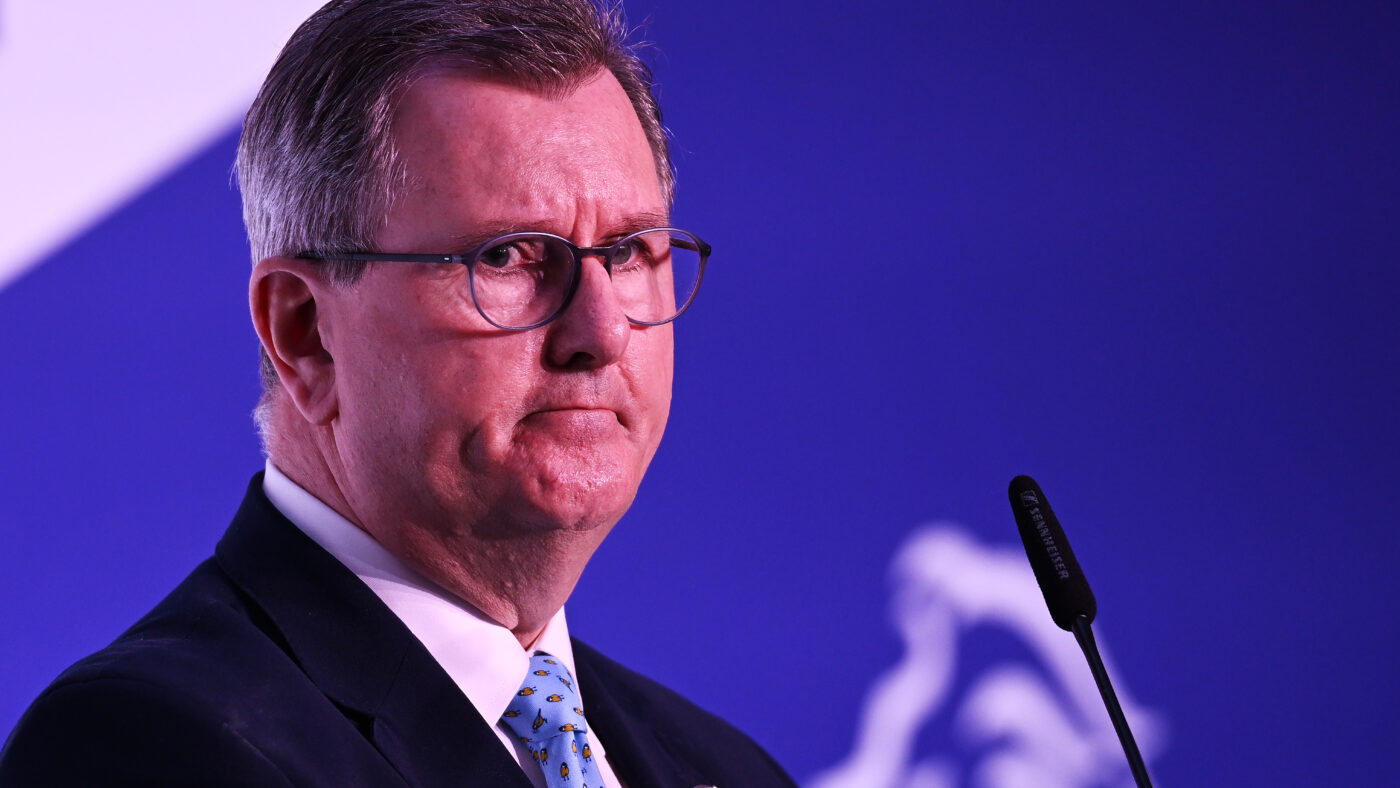For weeks, commentators have expected the DUP to strike a deal with the government over the Windsor Framework and restore power-sharing in Northern Ireland. The party’s leader, Sir Jeffrey Donaldson, has argued increasingly forcefully that devolution is necessary to protect the province’s place in the UK and ministers at Westminster have praised the ‘constructive tone’ of negotiations about bringing Stormont back.
These attempts to create positive ‘mood music’ have been obvious and there has, at times, been the appearance of choreography between the two sides. But there are also some obvious problems with the thesis that an agreement is imminent.
For example, there is little evidence that the government intends to make an offer that would effectively remove the Irish Sea border, as Donaldson has requested. And, just as significantly, the DUP’s boycott remains popular with unionist voters in Ulster, even as the party seems to be edging toward ending it.
A new poll in the Belfast Telegraph this week suggested that the strategy has helped the DUP to close the gap with Sinn Fein. The Irish republican group became the biggest party in the Northern Ireland Assembly for the first time at last year’s election, beating its unionist rival by 8% of the overall vote. That gap has now narrowed to 3 points.
Over 60% of unionists told the pollsters that the DUP should continue to boycott Stormont until the protocol/framework is removed, while more than 90% of pro-Union voters said that the Irish Sea border should be renegotiated. That result implied that Donaldson’s own supporters think that it is more important to restore Northern Ireland’s place in the UK internal market than reboot the Stormont Assembly.
If the DUP leader ignores this sentiment, he risks fracturing his own party and hampering its efforts to retake a lead over Sinn Fein. When Donaldson initially withdrew support for power-sharing, back in February 2022, it marked the start of a recovery for the DUP, after three years of turmoil and declining poll ratings that bottomed out at 13% (in the latest poll it is on 28%).
The party’s first minister at the time, Paul Givan, resigned because his party was required to implement an Irish Sea border that it abhorred. Donaldson argued that the chief principle of power-sharing, that controversial policy changes must be agreed by both unionists and nationalists, was being trashed by the imposition of the Northern Ireland Protocol.
The system, as he saw it, could not continue to operate as normal.
The problem for Donaldson now, is that the government continues to claim that it solved the Irish Sea border’s problems through the Windsor Framework, even though the flaws of that deal have been exposed repeatedly by critics as varied as the House of Lords’ Brexit committee and the FT.
The DUP is reported to want legislation that will guarantee Northern Ireland’s integral place in the UK economy, but previously it set out ‘seven tests’ that it claimed must be met, to secure a return to Stormont. The party’s spokespeople have cited these criteria less often recently. However, Donaldson wrote to members last week, insisting that, ‘The government has to undo the harm caused by the Northern Ireland Protocol and redress the political balances that have been upset’.
In particular, he said that his party’s objectives include, ‘restoring and future-proofing in law our Article 6 rights under the Acts of Union’. The protocol ‘disapplied’ this clause, which specified that, ‘The subjects of Great Britain and Ireland shall be on the same footing in respect of trade and navigation, and in all treaties with foreign powers the subjects of Ireland shall have the same privileges as British subjects’.
To unionists, that article’s disapplication represented the removal of one of the chief foundation stones of Northern Ireland’s place in the United Kingdom. It shaped their argument that the sea border is not just a practical barrier to trade, but an important constitutional change that diluted the province’s British status without candour or consent.
Despite the persistence of this damage to the Union, Donaldson and some of his allies in the DUP are clearly eager to get back to Stormont, which gives them powers, positions and funding. Sir Jeffrey told his party’s recent annual conference that power-sharing was an essential element in ‘building our case’ (for the Union). In a letter to the Belfast News Letter last week, he wrote that, ‘Support for the Union was at its highest in Northern Ireland when we had fully functioning devolution. In a NI that is changing, unionists need to broaden support for the Union’.
Many unionists, including the Ulster Unionist Party, share this analysis that the boycott could start to undermine Northern Ireland and its place in the UK. The last few years have seen the growth in Ulster of the constitutionally ‘agnostic’ Alliance Party, whose supporters both the UUP and the DUP would like to win back to unionism.
Donaldson has encouraged the idea that he may strike a deal with the government ‘within weeks’, but he insists that there are ‘gaps’ between ministers and the DUP. He has stressed the importance of devolution repeatedly, implying that it is essential to the Union, but claims that his party will ‘not be afraid’ to say no, if the situation requires it.
This ‘will they, won’t they’ dance makes for good newspaper copy. But self-identified unionist voters, at least, seem focussed on the protocol and the damage they believe it has inflicted on Northern Ireland and its Union with Great Britain. If any deal to restore power-sharing fails to solve those problems, their anger could quickly become directed at the DUP.
Click here to subscribe to our daily briefing – the best pieces from CapX and across the web.
CapX depends on the generosity of its readers. If you value what we do, please consider making a donation.


